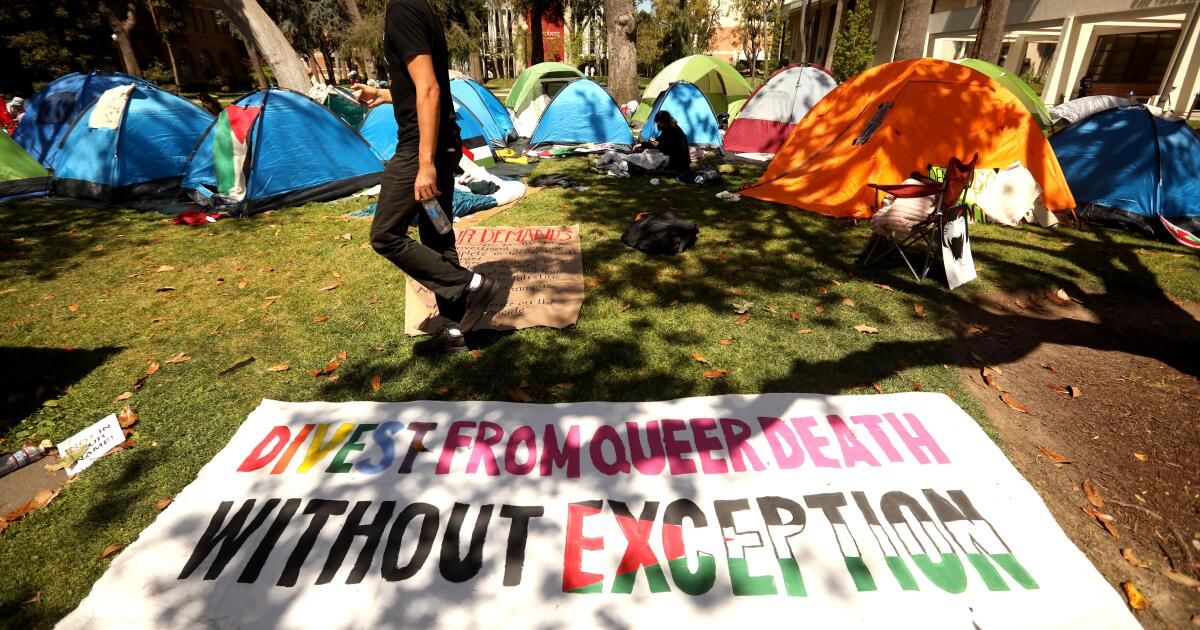To the editor: David N. Myers and Nomi M. Stolzenberg are trying to determine what makes a campus protest anti-Semitic. (“Can You Distinguish a Legitimate Campus Protest From Anti-Semitism? This Guide Aims to Help,” Opinion, Sept. 16)
Her definition reminds me of the president of Harvard, who, when asked whether calling for genocide of Jews violated the university's student code of conduct, told a congressional committee that it “depends on the context.” She was later forced to resign.
Stolzenberg and Myers argue that shouting “from the river to the sea” may not be anti-Semitic if what protesters mean is creating a state of Palestinians and Jews.
There are dozens of Muslim countries. There is only one Jewish nation. We must believe that eliminating the one Jewish nation and replacing it with a Muslim Jewish nation is not harmful to the Jews.
They claim that shouting “intifada” may not be anti-Semitic. The only way that term is used is to support a violent uprising that results in the deaths of large numbers of people they oppose.
Jerry Freedman, Los Angeles
..
To the editor: I applaud the nuanced distinction Myers and Stolzenberg make between acceptable debate and unacceptable intolerance, but their analysis does not condemn the use of anti-Semitism as a weapon to defend against or distract from any legitimate criticism of Israel's occupation of Palestinian territory.
Protests against Israel’s bloody and relentless siege of Gaza can easily be distinguished from expressions of anti-Semitism. The reality is that those who today defend the apartheid policies of a manifestly intolerant Israeli regime realize that there is no justification for these flawed and discriminatory policies, and so they resort to accusations of anti-Semitism.
The authors refer to a guide that helps identify anti-Semitism. If we apply the criteria to campus protests, there are very few examples of violations of these guidelines. But, as we have seen, the pro-Israel faction has categorically condemned the use of certain protest slogans that, as the authors acknowledge, are not necessarily anti-Semitic.
Rather, the rhetoric used to describe the apartheid conditions resulting from the occupation, including terms such as “intifada” and “genocide,” constitutes a reasonable criticism of Israel’s violation of Palestinian self-determination.
Andrew Spathis, Los Angeles
..
To the editor: The writers have the credibility to understand the historical context, but they choose to ignore it without explanation.
“From the river to the sea,” in the minds of the protesters, may seem harmless at first glance, but how can anyone forget its original, chilling meaning? The original intention was to decimate the State of Israel, especially as a refuge for Jews expelled from their own countries, and, by extension, the elimination of Jews in the world.
The quote is definitely anti-Semitic and cannot be separated from its source.
Suzan Lowitz, Los Angeles
..
To the editor: Myers and Stolzenberg's argument contradicts many of the protections under U.S. civil rights laws and international human rights laws.
Many of these laws do not rely—as the authors incorrectly imply—on often impossible assessments of intent to determine prohibited discriminatory conduct. Their definitions would potentially and harmfully permit many forms of unlawful intimidation and discrimination against individuals and groups.
Discriminatory outcomes are of great importance in civil and human rights law. The argument Myers and Stolzenberg make undermines the rights and well-being of not only Jews and Israelis, but also Muslims, Arabs, women, African Americans, LGBTQ+ people, and other minority groups.
Myers and Stolzenberg are right that intent matters morally and legally, but it is not the only thing that matters. Discriminatory outcomes are also key concerns of both the law and university codes.
Noam Schimmel, Berkeley
The author is a professor of global studies at the University of California, Berkeley.











